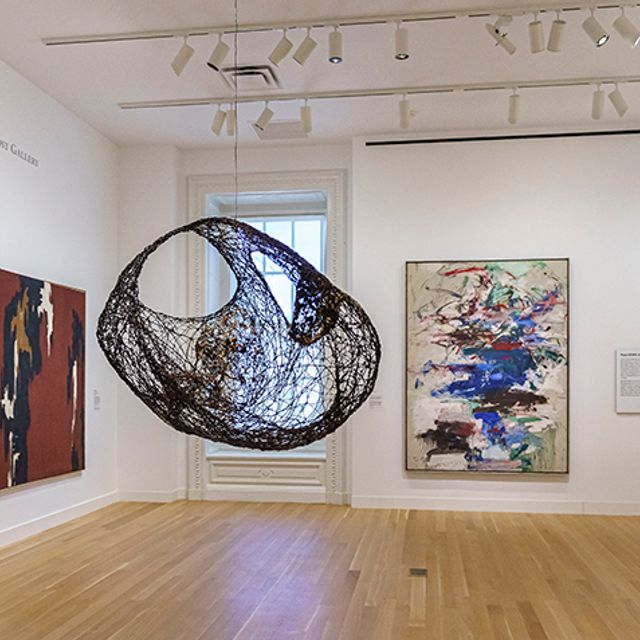Smithsonian American Art Museum Acquires Artworks by Janet Echelman, Maya Lin and Leo Villareal
INSTALLATIONS PART OF "WONDER" EXHIBITION AT ITS RENWICK GALLERY
The Smithsonian American Art Museum announced today that it has acquired three artworks from its popular exhibition “WONDER”—“1.8 Renwick” (2015) by Janet Echelman, “Folding the Chesapeake” (2015) by Maya Lin and “Volume (Renwick)” (2015) by Leo Villareal.
“WONDER,” the debut exhibition at the recently reopened Renwick Gallery, featured immersive installations by nine leading contemporary artists. The artists were selected for their ability to dissolve the boundaries between craft, art and design, and for their focus on process and materials. Each selected a gallery in the Renwick’s historic building and created an installation inspired by that space. More than 700,000 people have seen “WONDER” since it opened in November 2015; the exhibition closes July 10.
“When we asked these exemplary artists to create something transformative, to create installations that would be truly out of the ordinary, we could not have imagined how successful the results would be,” said Betsy Broun, The Margaret and Terry Stent Director of the Smithsonian American Art Museum. “The works by Lin, Echelman and Villareal captured the imagination of our visitors no matter their age or knowledge of contemporary art. This sense of ‘wonder’ is an experience that museums strive to create, and we are delighted to be able to acquire such a good selection from the exhibition.”
Echelman’s “1.8 Renwick” is on view until early spring 2017, and Villareal’s “Volume (Renwick)” is expected to remain on view indefinitely. The installations by Lin and Echelman are artworks that can be reinstalled at another time. The future potential for displaying these three artworks were key factors in the decision to acquire them for the permanent collection.
Echelman’s colorful fiber and textile installation, now titled “1.8 Renwick,” fills the Bettie Rubenstein Grand Salon. The piece explores volumetric form without solid mass and examines the complex interconnections between human beings and the physical world. A massive, hand-knotted net echoing the map of energy released by the 2011 tsunami near Japan is suspended above a carpet reflecting topographic information about the sea floor below; the title references the number of microseconds by which the day was shortened as a result of the catastrophic event.
Lin’s “Folding the Chesapeake,” a cartographically accurate map of the Chesapeake Bay watershed, references her ongoing investigation into representing natural forms in her works and her commitment to environmental conservation. The materials she chose for the piece, industrial glass marbles, are an allusion to her father’s experiments in the fledgling studio-glass movement of the 1960s. The individual marbles evoke the thousands of separate yet interdependent species of flora and fauna comprising the bay’s delicate ecosystem. The artwork, no longer on view, spread across the floor and walls of a second-floor gallery at the Renwick.
Villareal’s light sculpture “Volume (Renwick),” installed above the Renwick’s Grand Staircase, combines simple, utilitarian materials and forms with emerging technology to create a sensory, kinetic environment. An algorithm written by the artist creates patterns of light and dark at varying speeds that never repeat in exactly the same sequence with 23,000 LED bulbs embedded in mirrored steel rods. In the sculpture, binary code is transformed from an abstract series of 1s and 0s into a visual presence that is simultaneously physical and ephemeral, altering visitors’ perceptions of the surrounding space.
“Volume (Renwick)” was a gift to the museum from Janet and Jim Dicke, Tania and Tom Evans, Paula and Peter Lunder and Debbie Petersen in honor of Broun. Petersen also donated “Folding the Chesapeake,” while “1.8 Renwick” was purchased for the museum through its patrons group, the American Art Forum.
Note to editors: Selected high-resolution images may be downloaded from americanart.si.edu/pr. Email americanartpressoffice@si.edu for the password. Additional information about “WONDER” is available in an online press kit.
About the Smithsonian American Art Museum and its Renwick Gallery
The Smithsonian American Art Museum is the flagship museum in the United States for American art and craft. It is home to one of the most significant and inclusive collections of American art in the world. The museum’s main building, located at Eighth and G streets N.W., is open daily from 11:30 a.m. to 7 p.m. The museum’s Renwick Gallery, a branch museum dedicated to contemporary craft, is located on Pennsylvania Avenue at 17th Street N.W. and is open daily from 10 a.m. to 5:30 p.m. Check online for current hours and admission information. Admission is free. Follow the museum on Facebook, Instagram, LinkedIn and YouTube. Smithsonian information: (202) 633-1000. Museum information (recorded): (202) 633-7970. Website: americanart.si.edu.














